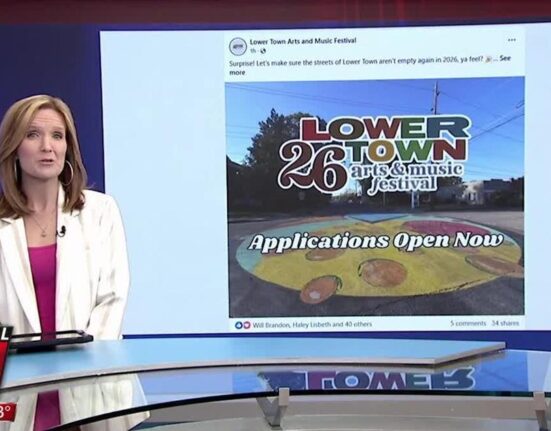A reality TV show I’d been watching for 17 seasons finally got interesting when it admitted the entire concept wasn’t working.
Sister Wives has followed Kody Brown’s Mormon polygamous family since 2010, but in 2021, one of his wives left. Then another, and another, and another. Now, he’s monogamous.
In a voiceover during the TLC series’ opening credits, Brown states that “love should be multiplied, not divided.” In later seasons, the wives began giving the vibe that they weren’t really feeling that love. The first one to flee their arrangement was Christine Brown Woolley. Her recently released tell-all memoir, Sister Wife, exposes the neglect and conflict that polygamous culture encouraged her to bury for decades.
Janelle Brown, Christine Brown, Kody Brown, Meri Brown and Robyn Brown present a united front in the first season of Sister Wives before it all fell apart. (TLC/Courtesy Everett Collection)
Woolley’s book hit shelves just days before Splitsville, a dark comedy about the trappings of marriage and the complexities of polyamory, was released in theaters everywhere. In the film, a woman asks for a divorce from her husband because she’s been unfaithful. When he seeks advice from his married friends, they say the secret to their relationship’s success is polyamory. Naturally, it all blows up in their faces, leading to an explosive fight that pokes fun at the lengths couples will go to in order to stay together for the sake of money and kids. It all feels so hopeless.
These examples follow a spike in books and TV shows depicting poly lifestyles in 2023 and 2024, which some say sensationalized the concept as a revolutionary and potentially relationship-saving solution.
But polyamory isn’t just a pop culture trope; it’s become a more common practice in real-life relationships. According to Pew Research data from 2023, one-third of Americans surveyed said open marriages are somewhat or completely acceptable. It’s popping up on dating apps as Hinge, Bumble and Tinder expanded their relationship options to include ethical nonmonogamy, and Feeld, which bills itself as the dating app for “open-minded individuals,” is taking up more of the market share.
Writer Olga Khazan noted the shift in attitudes toward polyamory in early 2024, as the fallout of the #MeToo movement placed value on transparency in relationships and the pandemic made people anxious about the fleeting nature of life and more open to experiencing new things.
As of 2025, polyamory may be increasingly normalized, but its representation in pop culture has turned sour. As the pendulum of popularity shifts from monogamy to nonmonogamy to monogamy again, therapists point to a range of factors that could explain why it’s become such a bummer onscreen.
It doesn’t ‘fix’ a relationship
“I think the obsession with polyamory missed what people were actually craving — sex with more people,” Brooklyn, N.Y.-based therapist Julie Goldberg tells Yahoo. “To me, that’s still alive and well in NYC, just not through a polyamorous lens.”
Goldberg, who jokes that she practices in the “heart of the polyamory bubble,” says she’s seen other therapists end their own polyamorous relationships. Even the author of Polysecure, a 2020 book about nonmonogamy and attachment, is now functionally monogamous, Goldberg says.
As a relationship construct, she says it’s no longer intellectually appealing. Instead, Goldberg says serial dating and “hall passes” have become more popular for couples who might have considered committing to polyamory, and as a result,” things are getting way less complicated.”
Michael Angelo Covino, Kyle Marvin, Adria Arjona and Dakota Johnson play the members of two different couples who dabble in polyamory in the movie Splitsville. (Neon/Courtesy Everett Collection)
Because polyamory is sometimes deployed as a last-ditch effort to save a relationship, it can be blamed for making everything fall apart. That’s not always the real reason for a breakup, which is likely deeper and more personal — like it is in Splitsville, when the couples just stop liking each other, or in Sister Wives, when relationships built upon a foundation of something less than true love started to fall apart.
It’s no longer taboo — just difficult
“Culturally, it’s easy to scapegoat nonmonogamy because it makes for a cleaner narrative,” sex therapist Lauren Consul tells Yahoo.
That certainly applies to the couples in Splitsville, though the difficulties of polygamy were always at the root of the conflicts among the cast of Sister Wives. But they didn’t turn to it because it was trendy — it was a religious necessity that people loved to gawk at.
There’s less gawking now, some say. Polyamory was introduced to much of the public through shows like HBO’s Big Love, which made it seem foreign and unusual, but as it became a more common way for people to navigate relationships, it became less fun and forbidden and more complicated.
Richelle Dadian, a psychologist who specializes in ethical nonmonogamy, tells Yahoo that now that polyamory is less “taboo,” people are talking about it more before diving into it — and that’s good, because it’s a lot of hard work.
“Of course, it doesn’t work for everyone … folks need to have several skills, including excellent communication, the ability to self-reflect and introspect and emotional intelligence,” she says.
On the other hand, mental health counselor Alyson Curtis doesn’t think there’s been much of a shift in attitude toward polyamory at all. It’s always been ridiculed. It was recently the butt of jokes in topical shows like And Just Like That…, when Charlotte’s daughter’s “polysexual” ballerina boyfriend seemingly existed as a character just to be made fun of. That may reflect our culture’s tendency to rush toward judgment when things seem outlandish.
“Many people don’t practice curiosity on a consistent basis,” she tells Yahoo. “It’s perfectly OK to determine polyamory isn’t for you, and simultaneously, it doesn’t mean the concept as a whole is inherently broken and thus laughable.”
People love watching relationships break down
Curtis says we’re having a moment of “fear-based regression” in the U.S. right now, leading people to cling to traditional values and rebuke practices like polyamory, which require openness and curiosity. As a society, we might be fascinated by novelty, but we’re also naturally jaded.
Skepticism and backlash are natural responses to any sort of phenomenon, especially when it comes to our own interpersonal and romantic relationships. Polyamory no longer feels shiny and new. When it fails, it makes headlines. When it succeeds, it feels routine — practical like a work schedule or a joint mortgage payment, therapist Kaila Hattis tells Yahoo.
It feels like we’re watching and reading stories about it blowing up now more than ever because that’s what makes an appealing story: Conflict, jealousy and the dissolution of a love affair. The people quietly and stably living together aren’t serving as juicy entertainment.
“That evolution might feel less flashy to the outside world, but it reflects growth in our cultural conversation about love, intimacy and choice,” therapist Tammy Nelson tells Yahoo. Perhaps it’s now flashier for polyamory to fail onscreen because the concept itself is no longer new.











Leave feedback about this